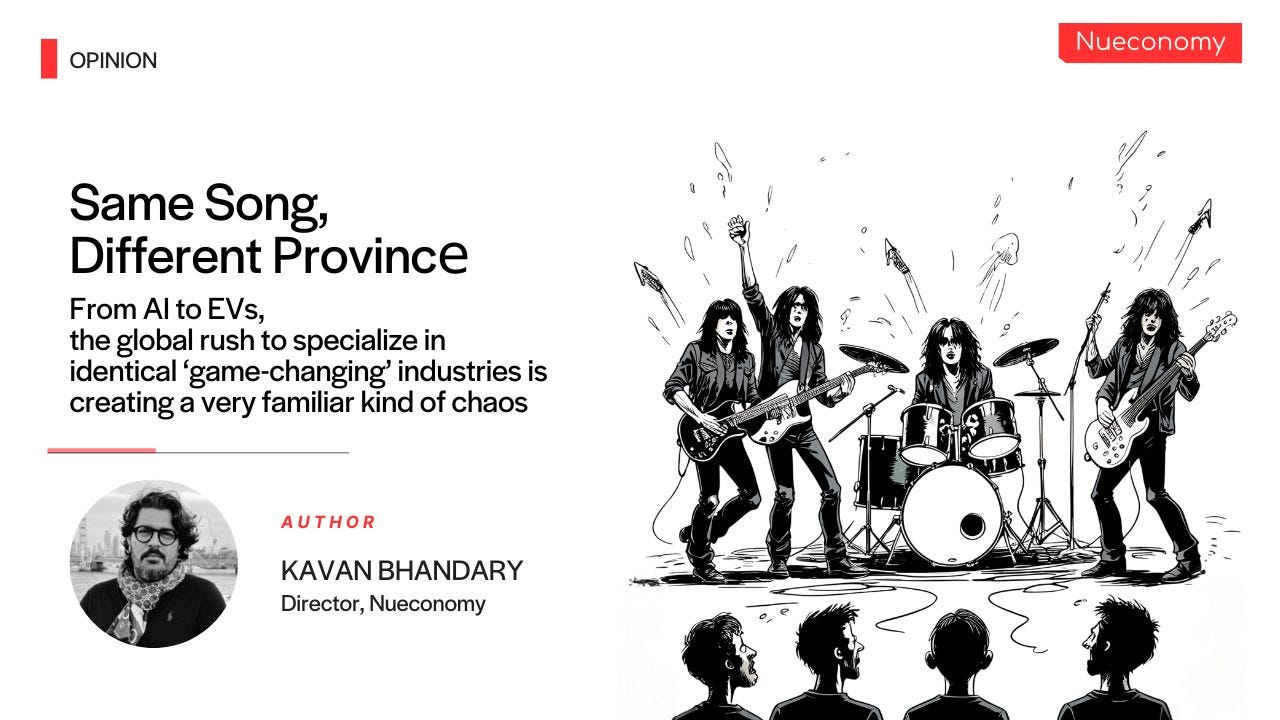Copy of Same Script, Different Stage: The Global Herd Mentality in Economic Development
When Chinese President Xi Jinping recently questioned whether every province needed to develop artificial intelligence, electric vehicles, and computing power, he inadvertently highlighted a problem that extends far beyond China's borders. His rare public rebuke of local officials at the Central Urban Work Conference reveals a troubling global pattern: the herd mentality driving economic development strategies worldwide.
As Founder of Nueconomy, an economic development consulting firm, I've witnessed this phenomenon firsthand across multiple continents. Investment promotion agencies (IPAs) from Dublin to Dubai are chasing the same sectors with an almost religious fervor. AI, battery technology, fintech, and green energy dominate their pitches, often at the expense of existing competitive advantages.
Xi's criticism that Chinese provinces are crowding into identical emerging industries reflects what I see in boardrooms across the world. Every government wants to attract Tesla's next gigafactory or OpenAI's next research center.
The problem isn't ambition—it's the dangerous uniformity of that ambition.
The numbers from China tell the story. Approximately 30 provinces have unveiled individual plans for deploying new-type energy storage since 2019, with these plans collectively aiming for a combined capacity of 60 GW, surpassing the NEA's original 2025 target of 30GW. This overcapacity has pushed the capacity utilisation rate in China's EV sector to reportedly about 50 per cent.
Nominal growth rate, which accounts for price changes, was only 3.9 per cent in the second quarter, the least outside the pandemic since the quarterly data began in 1993.
But China's overcapacity crisis is just the most visible symptom of a global disease. In my work with IPAs worldwide, I've seen textile hubs in South Asia abandon their manufacturing expertise to chase AI investments they're ill-equipped to support. Resource-rich African nations ignore their mining and agricultural advantages to pursue fintech clusters that lack the necessary financial infrastructure. Eastern European countries with strong automotive supply chains pivot toward battery manufacturing without considering whether their location offers competitive advantages in that space.
This isn't just about poor resource allocation—it's about missed opportunities. When everyone targets the same sectors, traditional industries that still create substantial employment get starved of investment and attention. A successful garment manufacturer in Bangladesh creates more immediate jobs and economic impact than a speculative AI startup that may never materialise. Yet IPAs increasingly view such "old economy" investments as second-tier prizes.
The herd mentality also creates blind spots in source market strategy. IPAs focus obsessively on Silicon Valley, Taipei, London and a handful of other hubs while ignoring investors from regions with complementary strengths in sectors where they have competitive advantages. A logistics hub in Southeast Asia might be better served by attracting German automotive suppliers than chasing autonomous vehicle startups.
Xi's criticism of officials who make "rash decisions" and then "slip away" when projects fail resonates globally. Political cycles incentivise officials to announce flashy tech initiatives rather than the more complex work of strengthening existing clusters or developing region-specific advantages. The ribbon-cutting ceremony for an AI centre generates more headlines than incremental improvements to port infrastructure, even if the latter creates more lasting economic value.
The solution isn't about abandoning innovation or rejecting new technologies. It's about honestly assessing competitive advantages and focusing on targeted specialisation rather than adopting a scattergun approach. Singapore succeeded not by trying to be everything to everyone, but by leveraging its geographic and regulatory advantages in specific sectors. Ireland built its tech hub on decades of investment in education and business-friendly policies, not by simply declaring itself an innovation centre.
Economic development requires patience, self-awareness, and the courage to say no to trendy sectors that don't fit local advantages.
As Xi's rare moment of candour suggests, sometimes the best strategy is admitting that not everyone can—or should—be building the same future.



